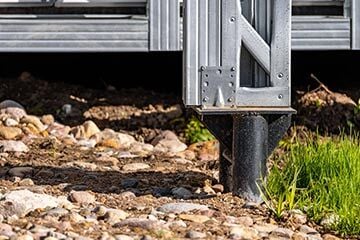If you're keeping your possessions in a storage unit, you can protect them with a specialist storage insurance policy.
You might be covered with home contents insurance, but consider specialist insurance if you're keeping your belongings in storage for an extended period of time.
Storage insurance can secure your residential or business items, but there are restrictions for what you can store and what is covered by your insurer.

What is storage insurance?
Storage insurance is a specialist policy that can protect residential or business belongings while you keep them in a storage unit.
Buying a policy can cover you against risks like fire and theft while you keep your possessions stored. It could also provide you with protection while you're transporting belongings.
We don't currently compare storage insurance quotes at Confused.com, but you can compare home insurance policies that offer some level of temporary protection. Be sure to research specialist insurers that can offer policies to suit your exact needs.
Does contents insurance cover items in storage units?
Some home contents insurance policies can provide cover for a limited time. You must check with your insurer whether your policy includes protection for storage, or if they can offer cover as an optional extra.
If you need to make a claim and you've not let your insurer know that your items are in storage, you might invalidate your policy. That means your insurer might not pay to cover the cost of repair or replacement.
There’s a few instances where your insurer could cover you:
- Moving house - Your possessions can be protected in transit between homes. If you need storage during this process, you could be covered for up to 7 days with some policies.
If you think the move is going to take longer than 7 days, you could get a slight extension. But this could result in losing some of the comprehensive cover you would normally expect in the home. Such as for your high value items like jewellery.
- Alternative accommodation cover - In the event your home becomes uninhabitable due to a fire or flood, contents insurance would cover your items if you had to store them.
This is only for a limited time period, so always check how long you're covered for and exactly what's protected. When this expires, or if it’s not comprehensive enough for your needs, get a specialist policy.
Do I need storage insurance?
It isn't compulsory by law, but storage companies typically require you to insure your belongings while keeping your possessions in their unit.
You might expect these companies to have liability insurance for anything that happens to your items but this is often not the case. Most companies take little responsibility for what happens to your items.
Can I store items for business purposes?
Yes, many specialist insurance providers also offer business storage policies. You should be able to find cover for:
- Office equipment such as desks or chairs
- Paperwork including documents and accounting records
- Stock relating to your business
Insurers could offer cover for different types of storage, including self storage, containerised storage, and warehouse storage.
How do I buy storage unit insurance?
Most storage companies insist you insure your belongings while using their facility and could offer you insurance directly. But this is likely to be more expensive than finding a specialist provider.
It's always worth shopping around online to find the best quote first. In some instances, storage companies don't allow insurance provided by a third party, so you have to buy it directly.
What factors affect the cost of storage insurance?
The cost of storage insurance can vary quite significantly, with a few factors influencing the final price.
One of the most dominating factors is the total value of the items that you are storing. A long story short, the more your belongings are worth, the more you can expect to pay. High-value items are also likely to increase your premium.
The location of the storage unit can also impact the cost, this is because storage units in areas with higher crime rates, or a larger risk of natural disasters, often have higher insurance costs.
Additionally, the security features of the unit (e.g. CCTV cameras, gated access, alarm systems) also affect the price, as high-quality security can sometimes lead to a lower premium.
To find the best price for your storage facility, it is a good idea to shop around using our price comparison website. Confused.com does not offer storage insurance directly.
However, we can still help you find home insurance policies that may cover your items while they are in storage temporarily!
What's does storage insurance cover?
It can depend on the insurer and policy, but storage insurance can typically provide cover for:
- Computer and electronic office equipment
- Deeds, registered bonds and other personal documents - normally up to a set value limit
- Household furnishings, furniture, carpets, curtains, and home appliances, including gas and electric cookers and telephone equipment
- Bicycles - normally up to a set value limit per cycle
- Machinery, stock and tools
- Personal possessions
- Stamp collections and coin collections, with proof of ownership and providence - normally up to a set value limit
- Valuables - normally up to a set value limit
Also often covered is loss or damage to stored contents in the event of:
- Natural disasters, including lightning, earthquake, storm, flood and weight of snow
- Fire and explosion
- Leaking water/liquid from fixed water tanks and pipes
- Theft and attempted theft, with proof of violent breaking and entering (e.g. broken lock or window)
- Falling trees, telegraph poles and lamp posts
- Collision by a vehicle or animal
- Impact by aircraft and other flying devices or items dropped from flying aircraft
- Rioters, violent disorders, strikes, labour disturbances, civil commotion and malicious acts
What does self-storage insurance not cover?
There are exceptions, these also vary depending on the policy and insurer - so you need to check to confirm. But generally you're not covered for:
- Units outside the UK
- Units without proper security in place such as CCTV and fire alarms
- Currency including cash, debit or credit cards or vouchers
- Dangerous items such as firearms, flammable contents or explosives
- Items stored in wooden crates
- Accidental damage
- Items held on behalf of other people
Is my car covered in storage?
Most storage policies generally only cover contents and items, you might need specialist cover to protect a car.
You must advise your car insurer that you are placing the vehicle in storage. They may already offer protection as part of your policy, or as an optional extra. If they can't offer you cover, you should search for a specialist insurer that can.
You could apply for a statutory off road notification (SORN), meaning you don't have to pay tax or insurance on your car. But it’s a good idea to keep it insured where possible, as it covers your car if it's stolen or damaged when it’s in storage.
Tips for choosing a storage company
It's recommended you chose an accredited storage company that is a member of the Self Storage Association (SSA UK).
This gives you peace of mind that the company operates to a high standard and is accountable for its service. You should be able to find a member company in your local area.
When choosing a storage company it's important to consider:
- Price - Shop around for quotes, you could save money by spending time searching for the best deal.
- Security measures in place - For added peace of mind, compare the security features at each facility. For example, security staff, PIN code entry, or CCTV.
- Restrictions on specific items - Restrictions could vary between companies, so check before you commit to a storage unit.
- Location - Consider whether the unit location is appropriate for your needs. The unit itself should be well-ventilated, damp-free, and kept in a good condition to preserve your belongings.
- Ease of access to your items - Do you have to give notice to access your possessions? What are the opening times of the facility?







